- Home
- Leslie Meier
LStone 20 - Easter Bunny Murder Page 8
LStone 20 - Easter Bunny Murder Read online
Page 8
Chapter Eight
The view out the kitchen window on Saturday morning was uninspiring. A few patches of filthy snow still remained and the melting snow, combined with an overnight shower, had turned the yard into a muddy mess. Libby had to go out, of course, and tracked in quite a bit of mud on her paws, so Lucy had already mopped the floor once and figured she’d have to do it many more times before sunshine and warm weather eventually dried the mud. Sometime in July, she thought sourly, putting the mop away.
Hearing her daughters Sara and Zoe singing upstairs, she smiled. Mud season came and went, it was a nuisance, but it meant that warm summer days weren’t far off. It would be great to be able to open the window to warm, fresh breezes and to go outside without putting on bulky jackets, hats, and gloves. Lucy was itching to work in her garden, she wanted to get the peas and lettuce planted, she was looking forward to pulling those crisp and lovely French breakfast radishes.
Her garden tended to be on the wild side, she admitted to herself. She enjoyed the planting and the picking a lot more than the weeding and cultivating. She thought of the once perfect garden at Pine Point, where perennials sprouted where they were meant to be instead of the willy-nilly way they came up in her garden, and where weeds were dealt with promptly instead of when she got around to it. For years, she had envied VV’s garden, viewing it every summer when it was part of the annual garden tour benefiting the cottage hospital. She always left wishing she had the skill and energy to emulate even one of those ravishing perennial borders that bloomed gorgeously from spring right through September, but now the garden’s beauty seemed pointless, with no one to appreciate it.
And when you came to think of it, the perfect garden and the gorgeous house they had all so admired was really a bit of a sham. Somehow, you assumed that a beautiful house meant the people in them lived beautiful lives, but now she knew that wasn’t the case. VV’s house was a showcase, her garden an inspiration, but her family was a dysfunctional mess.
Zoe thunked into the kitchen in her green and white polka-dot mud boots and opened the refrigerator door. “I need something quick,” she said. “Today’s the pet parade.”
Sara was behind her; her boots were a jolly pink and green plaid. “Grab a couple of those yogurt drinks,” she said. “We’ve got to get going.”
“I can cook you some eggs,” offered Lucy. “It won’t take a minute.”
“We’ve got to be at the shelter in fifteen minutes,” said Sara. “We’ve got to get all the animals in their costumes and over to the nursing home by eleven.”
Lucy felt a little glow of pride. Sara and Zoe had been stalwart volunteers at the Friends of Animals shelter for years, donating hundreds of hours of time and not shrinking from the unpleasant jobs, either. They were both honor-list students and Sara had received a merit scholarship to the state university where she planned to study veterinary science.
The girls were zipping up their jackets, almost ready to go, and Lucy popped into the pantry where she grabbed a couple of granola bars. “Here you go,” she said. “I’ll see you later at the home.”
“You’re coming?”
“It’s an assignment. I’m covering it for the paper.”
“Don’t take any pictures of me, okay? I didn’t do my hair,” said Sara, sporting a ponytail.
“Or me,” said Zoe. “I’m wearing one of Dad’s hardware store sweatshirts.”
“I’ll just take pictures of the animals,” promised Lucy. “Now, scoot. You’ll be late.”
The pet parade was an Easter tradition at Heritage House Retirement Center, known to everyone in Tinker’s Cove as “the old folks’ home” despite the owners repeated campaigns to convince people to adopt the institution’s new corporate identity. It had always been “the home” and that’s what it would stay, but the new owners had made a lot of improvements. The rather grim old place had been remodeled and freshened up and the staff was more professional; on the other hand, the kitchen no longer served the buttery, creamy fish chowder that had clogged so many arteries in the past.
Today, most of the residents had gathered in the dining room, where they were watched over by a covey of nurses’ aides. Some were seated in wheelchairs, others were resting in an assortment of chairs: a wing chair here, a plastic dining chair there. A few seemed engaged, chatting and looking about expectantly, while others were dozing, heads drooping and chins resting on their chests.
Lucy placed herself in front of a window so the light, what there was of it, would be at her back, and got her camera ready. Felicity Corcoran, the activities director, clapped her hands and made a brief introduction. Someone flipped a switch and the familiar strains of the Easter Parade song were heard. Zoe was first, leading a sleek but nervous greyhound togged out in a blue jacket and top hat. They were followed by a bouncy little terrier in a straw bonnet, a dachshund with a polka-dot ruff around its neck, and an enormous black lab in a pink tutu.
Lucy snapped photos until there was a break in the parade, when she turned to the woman seated next to her who seemed bright and alert even though she was receiving oxygen from a portable tank on wheels. “What do you think of the show?” Lucy asked.
“What did you say?” the woman asked, leaning forward and cupping a hand around her ear.
“What do you think of the show?” shouted Lucy.
“I think they’ll have cupcakes,” replied the woman. “Or maybe cookies.”
“What’s your name?” asked Lucy, pen poised.
“I used to have a dog, a cocker spaniel,” said the woman. “It got hit by a car.”
“Oh, dear.” Lucy patted her on the shoulder and moved along to another resident, a white-haired woman who was engaged in a lively conversation with her neighbor, an old guy wearing a golf cap.
“Hi!” said Lucy, introducing herself. “What do you think of the show?”
“It’s very nice,” said the woman in a soft voice.
“Terrific,” boomed her companion. “I like dogs. All dogs. If I wasn’t stuck here, I’d have a bunch of dogs.”
“Which is your favorite?” asked Lucy, as a squabble broke out between the cute terrier and a collie. Bits of straw and artificial flowers went flying as the two went for each other, growling and baring their teeth.
“I’d put my money on the terrier,” said the old guy. “What do you say, Madge? A fiver?”
Madge shook her head. “Harvey, you know I don’t gamble.”
“She’s born-again,” said Harvey with a snort. “A holy roller.”
Madge smiled and rolled her eyes. “He’s just teasing—he knows I’m not one of those Evangelicals. I’m a Methodist.”
The unruly dogs had been removed and the music was starting again when Harvey tugged on Lucy’s sleeve. “Don’t tell anyone,” he whispered in her ear. “Madge is really a millionaire.”
Madge’s cheeks got even pinker. “Don’t listen to him.”
“It’s true. You told me yourself,” said Harvey. “You said that by rights you ought to be rolling in the stuff.”
“Well, ought and is are two different things,” said Madge. “If it wasn’t for Medicaid, I’d be living under a bridge somewhere.”
“You know that’s not true.” Lucy was surprised to recognize Izzy Scannell, the gardener from Pine Point. “You know I’ll always have a room for you.”
Madge raised her cheek for a kiss and Izzy bent down to plant one on her cheek. “This is better, dear. This way we both have our independence.”
Lucy smiled at Izzy. “Is she your mother?”
“Yup.” Izzy gave Madge a hug. “Mom, this is my friend Lucy Stone.”
Madge held out a small, plump hand and Lucy took it. “Margaret Scannell, but everybody calls me Madge. I’m pleased to meet you.”
“Same here,” said Lucy. “I work for the newspaper. Can you give me a quote, your reaction to the pet parade?”
“It’s adorable—but . . .”
“She’d rather have a beer!” exclaimed H
arvey, slapping his knee.
“Don’t be silly, Harvey,” said Madge, shaking her head. “You know I don’t drink.”
Izzy rolled her eyes. “Tough assignment?”
“You said it,” said Lucy. “I think I’ll concentrate on the animals.” Raising her camera, she moved closer to the open area where the animals were parading and got down on her knees, snapping some close-ups. Then she went into the hallway, where more dogs were lined up along with a few caged cats and bunnies, and took some more pictures of the pets and their handlers. She also collected some usable quotes, noting with amusement that Sara and Zoe were avoiding her.
When the parade was over and Lucy was leaving the building, she met Izzy, who was also headed to the parking lot.
“Your mom is very sweet,” said Lucy.
“Yeah, it’s too bad. She’s sharp as ever, she does the New York Times crossword every Sunday, but her body is failing her. She’s got a multitude of problems: heart trouble, diabetes, failing kidneys; she’s a walking medical encyclopedia.”
“I’m sorry,” said Lucy. “She’s got a wonderful attitude.”
“She does,” said Izzy. “She really does. And I’ll tell you, when I get depressed and worried about her, I just think about VV. My mom, on Medicaid, is a hundred times better off than VV, despite her millions. She gets good food, companionship, everything she needs. VV may be a millionaire, but, believe me, Mom is living better than she is.”
“You’re right,” said Lucy, eager to follow up on this opening. “You’re absolutely right. I was shocked by what I saw at Pine Point, and I can’t help worrying about VV. Have you seen her lately?”
Izzy paused, keys in hand, resting her hips against a silver VW bug. “Are you really a caterer, or were you doing a bit of investigative reporting at the funeral?”
For a moment, Lucy didn’t know what to say. “Investigative reporter!” she sputtered. “Don’t I wish.” She smiled ruefully. “I’m just a jill-of-all-trades, I’m part time at the paper, I try to fill in with whatever comes along. You know how it is. I’m scrambling like everybody else, trying to make ends meet in this economy.”
Izzy opened her car door. “I sure do,” she said, settling herself behind the wheel. “Do me a favor, run a picture of my mom with that story?”
“I’ll try,” promised Lucy, giving Izzy a little wave as she drove off.
Easter Sunday dawned cold and crisp, but at least the sun was out. Lucy was busy in the dining room, setting the table with her best china and silver. A pot of blooming hyacinths was in the center of the table and a growing collection of adorable ceramic bunnies was arranged on the damask cloth.
Lucy had invited Toby and Molly; Patrick’s place was set with a vintage Peter Rabbit plate Lucy had found at a thrift shop. She’d also invited Molly’s parents, Jolene and Jim Moskowitz, making sure to put Jim as far from Bill as she could. Bill didn’t like Jim, who owned a prosperous insurance agency, but Lucy was determined to maintain a positive relationship with the in-laws—not for their sakes, but to provide a supportive family for Molly and Toby and most especially, Patrick.
Lucy gave the table a final once-over, adjusting a napkin here and a fork there, and when she was satisfied everything was perfect, she went into the kitchen to baste the ham. She was bent over the oven when Bill came down the stairs.
“That smells great,” he said.
Lucy shut the oven door. “I’ve got deviled eggs and cru-dités for starters; there’s ham, scalloped potatoes, caesar salad, and baby peas for dinner and I made a fancy Easter basket cake for dessert. Do you think that’s enough?”
“Sounds great,” said Bill. “Is there beer?”
Lucy sighed. “Beer and rosé, to go with dinner.”
“I’ll stick with beer,” said Bill. “I suppose Jim will be looking for single malt Scotch.”
“Well, he’s out of luck, then,” said Lucy with a shrug. She studied her husband, handsome in the dress slacks and jacket he rarely wore. His hair was graying at the temples, true, but he still had plenty of it—and a twinkle in his eye. She smiled and rested her arms on his shoulders. “Can I get you to wear a tie?”
“No way,” he said, as Libby started to bark, announcing Jim and Jolene’s arrival. “Damn. They’re here.”
“Behave yourself,” warned Lucy.
“I will if he will,” grumbled Bill.
When she went to the door, Lucy was pleased to see that Molly and Toby were also arriving, which meant everybody focused on little Patrick. Sara and Zoe had set up a little egg hunt on the porch and everyone had a great time encouraging three-year-old Patrick as he searched for the brightly colored plastic eggs and placed them in a basket.
Then they all went inside, gathering in the living room where Sara and Zoe served the hors d’oeuvres and Lucy put the finishing touches on dinner. When they had all gathered at the table, Bill mumbled a quick grace: “Lord, for what we are about to receive, make us truly grateful, amen.”
“And for the gift of thy precious Son, also,” added Jim.
Lucy noticed Bill growing a little red under the collar as they all intoned another amen.
“That’s an adorable Peter Rabbit plate,” said Jolene brightly. “Wherever did you find it?”
“Oh, I don’t quite remember,” said Lucy, who knew perfectly well she’d snagged the plate for a dollar at Our Lady of the Harbor’s thrift shop.
“We gave Patrick a similar one,” continued Jolene. “Actually, a little set, with a bowl and mug as well as a plate. I found it at Tiffany’s—we were in Boston for a weekend getaway—and couldn’t resist.”
“That was the least of it,” said Jim, who was always eager to let everyone know he had plenty of money to spend and didn’t mind spending it. “She had to have a grandmother ring, too.”
Jolene blushed and held up her hand, waggling her finger. “No pressure, kids, but there’s room for plenty more stones on this ring. Right now there’s just this lonely little emerald.”
Molly and Toby exchanged glances; they tolerated Jolene’s meddling but didn’t enjoy it.
Lucy was about to get a fresh beer for Bill, who had gone from a slow simmer to something close to a full boil, when Jim leaned back in his chair. “You know, Bill,” he said, “a lot of folks our age don’t want to spend money on themselves—they don’t indulge themselves like we did with that weekend in Boston—because they want to leave a nice estate for their kids. But I tell Jolene here not to worry, you can have both. The way you do it, Bill, is with life insurance.”
“Uh, Jim, I think I’m pretty well set in that department,” said Bill, hoping to forestall the sales pitch he suspected was coming.
“I’m not saying you aren’t. I’m sure you have adequate coverage, but the truth is you can never have too much. Take me, for example. When I go—and let’s face it, Bill, statistics show that it’s us men who pop off first—Jolene here will be a rich woman.”
Jolene covered her husband’s hand with her own. “You know nothing will replace you, Jim. I’d rather have you than any amount of money.”
“Dad, I wish you wouldn’t talk about these things,” said Molly, who had taken Patrick out of the high chair and had set him on her knee. “We want you around for a very long time. We want to see you at Patrick’s wedding.”
Lucy was keeping an eye on Bill, who was using his knife to shove a few remnants of salad around on his plate. “I understand Lucy’s made a special Easter dessert,” he said.
“That’s right.” Lucy was on her feet, picking up Jim’s and Jolene’s plates.
“That was delicious, Lucy,” said Jim. “But just let me say this, Bill. With life insurance, you can create an instant estate for your loved ones; you can die a millionaire.”
“That’s fine,” said Bill, pulling a lottery ticket out of his pocket and displaying it. “But when it comes to gambling, I’d prefer a bet I don’t have to die to win.”
“Coffee?” said Lucy. “Who’d like coffee?”
Later, when the guests had left and Lucy was loading the dishwasher, she thought about what Jim had said. Bill had a modest life insurance policy, enough to cover the mortgage, but that was about it. With so many other demands on their finances, a big life insurance policy hadn’t seemed like a top priority. Lucy was confident in her ability to support herself if something happened to Bill, and, as for leaving a big estate for the kids, well, it seemed to her that it would be better for them to depend on themselves. She and Bill had never inherited very much; she’d gotten some money when her parents died, but it was little more than a nice nest egg, a cushion she kept for emergencies.
As she scraped the dishes and put them in the dishwasher, her eyes fell on the Peter Rabbit plate she’d been so proud of. Well, maybe Jolene had trumped her on that one, but she wasn’t going to let it bother her. She was willing to bet she’d gotten more pleasure out of finding that plate and buying it for a dollar than Jolene got out of her expensive Tiffany’s purchase. The hunt and the excitement of finding a bargain always gave her a bit of a high.
She shut the door and switched the machine on, listening to it hum. No matter how you looked at it, whether you had too little or too much, money was a problem. Look at VV, she thought. She had all that money, maybe even hundreds of millions of dollars, and it wasn’t bringing her—or her family—much happiness.
Little Viv, who was in her sixties, was apparently still dependent on her mother. Lucy wiped the counter down, wondering how much that “modest allowance” Peter Reilly had told her about actually was. Whatever the amount, it seemed more than ample for Little Viv’s needs. But what about Vicky? She was in her forties, brought up in an atmosphere of wealth and privilege. But if VV was holding tight to her money, and if Vicky’s husband wasn’t wealthy in his own right, well then Vicky might well be up against it financially. It would be only natural to feel that she was entitled to some of VV’s fortune. Indeed, she might be getting impatient, aware that she wasn’t getting any younger.

 Christmas Card Murder
Christmas Card Murder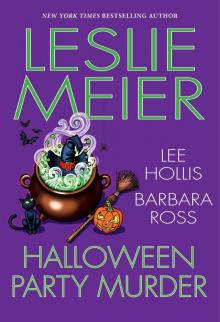 Halloween Party Murder
Halloween Party Murder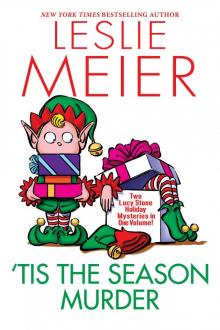 'Tis the Season Murder
'Tis the Season Murder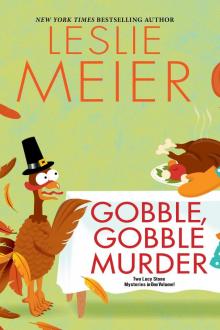 Gobble, Gobble Murder
Gobble, Gobble Murder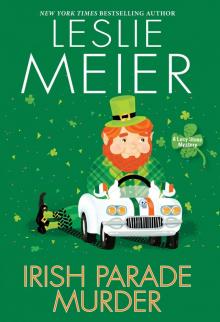 Irish Parade Murder
Irish Parade Murder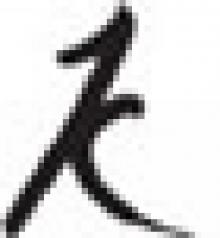 Bake Sale Murder
Bake Sale Murder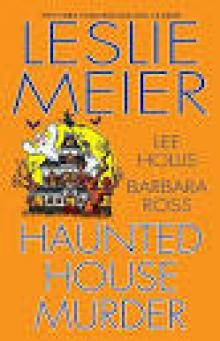 Haunted House Murder
Haunted House Murder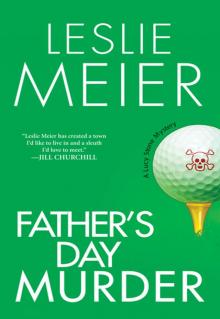 Father’s Day Murder
Father’s Day Murder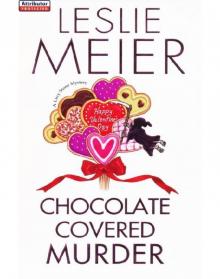 Chocolate Covered Murder
Chocolate Covered Murder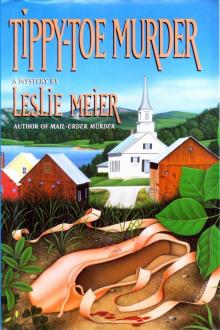 Tippy Toe Murder
Tippy Toe Murder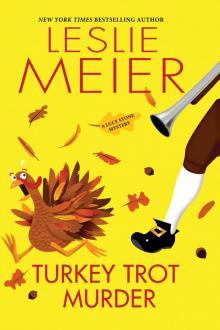 Turkey Trot Murder
Turkey Trot Murder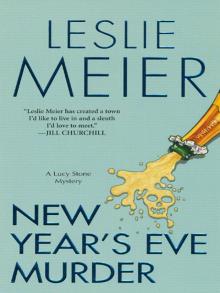 New Year's Eve Murder
New Year's Eve Murder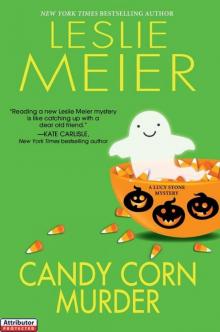 Candy Corn Murder
Candy Corn Murder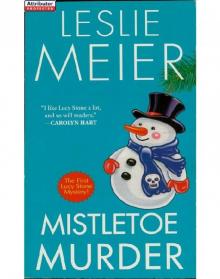 Mistletoe Murder
Mistletoe Murder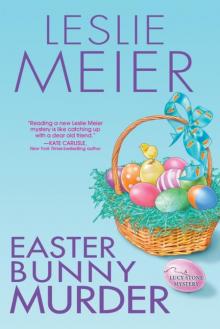 LStone 20 - Easter Bunny Murder
LStone 20 - Easter Bunny Murder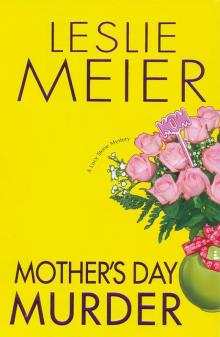 Mother's Day Murder
Mother's Day Murder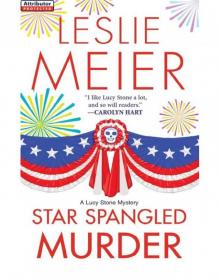 Star Spangled Murder
Star Spangled Murder Silver Anniversary Murder
Silver Anniversary Murder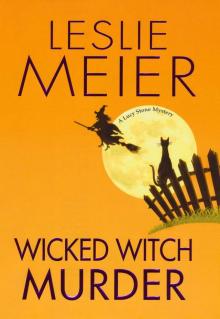 Wicked Witch Murder
Wicked Witch Murder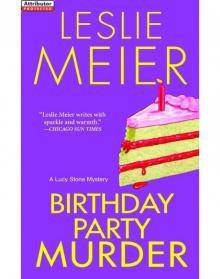 Birthday Party Murder
Birthday Party Murder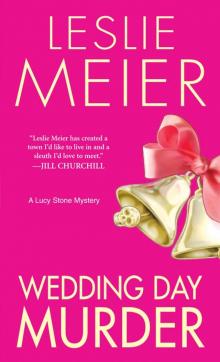 Wedding Day Murder
Wedding Day Murder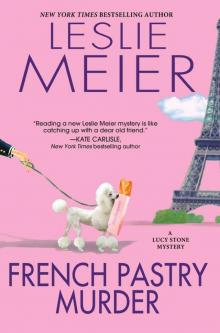 French Pastry Murder
French Pastry Murder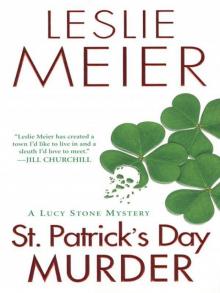 St. Patrick's Day Murder
St. Patrick's Day Murder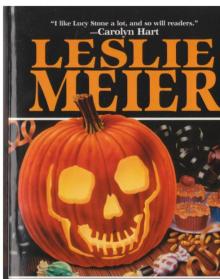 Trick or Treat Murder
Trick or Treat Murder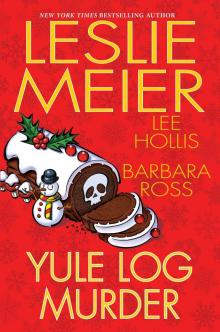 Yule Log Murder
Yule Log Murder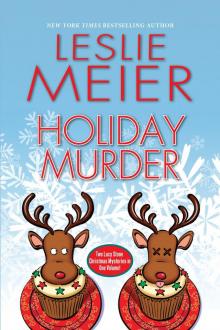 Holiday Murder
Holiday Murder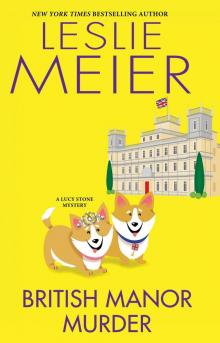 British Manor Murder
British Manor Murder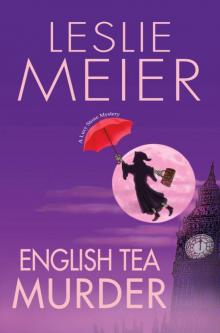 English Tea Murder
English Tea Murder